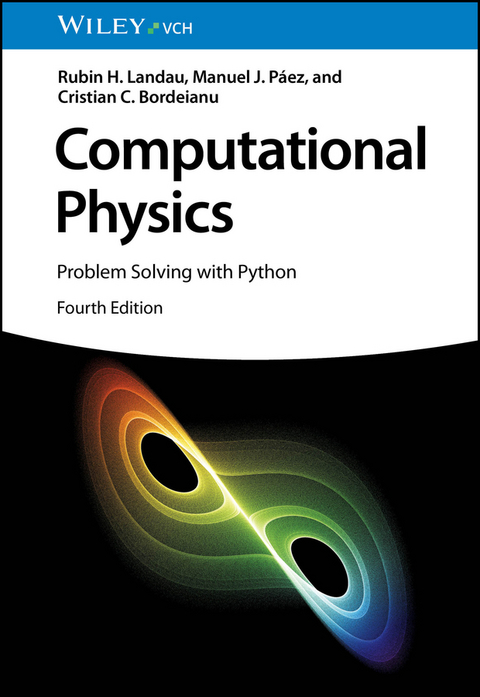Computational Physics
Wiley-VCH (Verlag)
978-3-527-41425-3 (ISBN)
Computational physics is a multidisciplinary subject combining aspects of physics, applied mathematics, and computer science with the aim of solving realistic physical problems. Physicists have a very precise mathematical theory describing how a system will behave, but more often than not, the underlying equations cannot be solved analytically for real-life problems. Therefore computational physics has become an integral part of the physics curriculum and modern physics research.
The textbook is designed for an upper-level undergraduate or beginning graduate course and provides the reader with the essential knowledge to understand computational tools and mathematical methods well enough to be successful.
Its philosophy is rooted in "learning by doing", assisted by many sample programs in the popular Python programming language.
The first third of the book lays the fundamentals of scientific computing, including programming basics, stable algorithms for differentiation and integration, and matrix computing. The latter two-thirds of the textbook cover more advanced topics such linear and nonlinear differential equations, chaos and fractals, Fourier analysis, nonlinear dynamics, and finite difference and finite elements methods. A particular focus in on the applications of these methods for solving realistic physical problems.
The new edition features an increased emphasis on data science applications and machine learning as well as entirely new chapters on general relativity and the computation physics of soft matter.
Rubin H. Landau, PhD, is Professor Emeritus in the Department of Physics at Oregon State University, Corvallis, Oregon, USA. In his long and distinguished research career he has been instrumental in the development of computational physics as a defined subject, and founded both the Computational Physics Degree Program and the Northwest Alliance for Computational Science and Engineering.
Manuel J. Páez, PhD, is a Professor in the Department of Physics at the University of Antioquia in Medellin, Colombia. He teaches courses in both physics and programming, and he and Professor Landau have collaborated on pathbreaking computational physics investigations.
Cristian C. Bordeianu, PhD, taughtPhysics and Computer Science at the Military College “Stefan cel Mare,” Campulung Moldovenesc, Romania.
Preface
PART I. BASICS
Introduction
Software Basics
Errors & Uncertainties
Monte Carlo Simulations
Differentiation & Integration
Trial-and-Error Searching & Data Fitting
Matrix Computing and N-D Searching
Differential Equations & Nonlinear Oscillations
PART II. DATA SCIENCE
Fourier Analyses
Wavelet & Principal Components Analysis
Neural Networks & Machine Learning
Quantum Computing
PART III. APPLICATIONS
ODE Applications; Eigenvalues, Scattering, Trajectories
Fractals & Statistical Growth Models
Nonlinear Population Dynamics
Nonlinear Dynamics of Continuous Systems
Thermodynamics Simulations & Fenyman Path Integrals
Molecular Dynamics Simulations
General Relativity
Integral Equations
PART IV. PDE APPLICATIONS
PDE Review, Electrostatics & Relaxation
Heat Flow & Leapfrogging
String & Membrane Waves
Quantum Wave Packets & EM Waves
Shock & Soliton Waves
Fluid Hydrodynamics
Finite Element Electrostatics
Appendices
Index
| Erscheinungsdatum | 18.04.2024 |
|---|---|
| Verlagsort | Berlin |
| Sprache | englisch |
| Maße | 170 x 244 mm |
| Gewicht | 1118 g |
| Einbandart | kartoniert |
| Themenwelt | Naturwissenschaften ► Physik / Astronomie |
| Schlagworte | Artificial Intelligence • Chemie • Chemistry • Computational Chemistry & Molecular Modeling • Computational Chemistry u. Molecular Modeling • Computer Science • Informatik • Künstliche Intelligenz • Mathematical & Computational Physics • Mathematische Physik • Physics • Physik • Python (Programmiersprache) • Rechnerunterstützung • Statistik |
| ISBN-10 | 3-527-41425-8 / 3527414258 |
| ISBN-13 | 978-3-527-41425-3 / 9783527414253 |
| Zustand | Neuware |
| Informationen gemäß Produktsicherheitsverordnung (GPSR) | |
| Haben Sie eine Frage zum Produkt? |
aus dem Bereich




